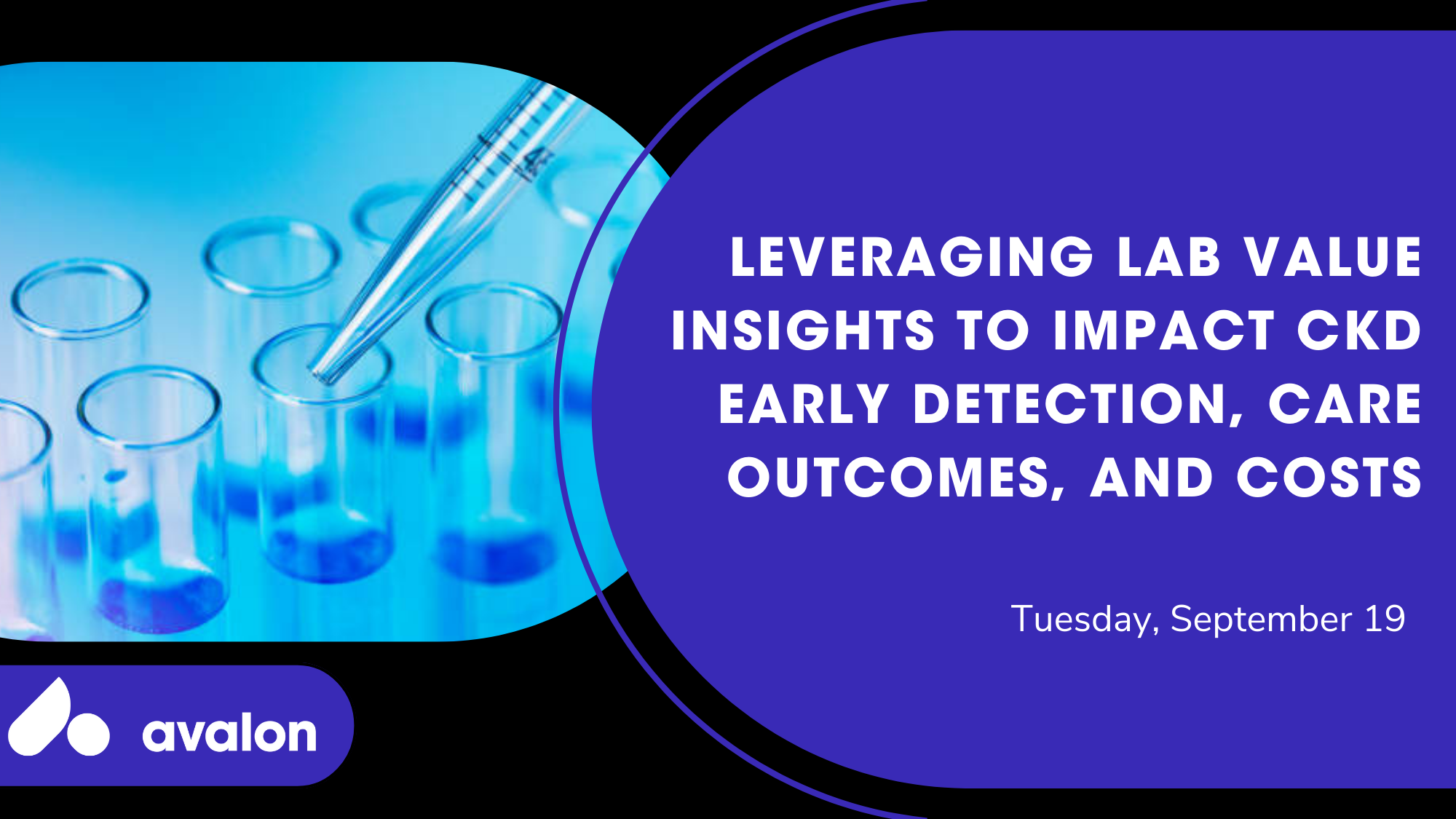Avalon hosted a panel of experts from the health insurance industry to discuss the management of Chronic Kidney Disease (CKD) through lab values, which can provide early identification and intervention. Chronic Kidney Disease is one of the most common illnesses (more than 1 in 7 people potentially have CKD). A surprising 90% of patients don’t know that they have it. CKD also weighs heavily regarding government expenditures: Medicare costs amount to $87B. Additionally, nine out of ten CKD patients are diagnosed at Stage 3 and later.
Key Takeaways:
- Early Identification: Sherry Mullies, Strategic Planning & Performance, Manager Vendor Strategy, from Blue Cross Blue Shield of North Carolina, talked about their success in identifying over 2100 members in stage 4 and stage 5 of CKD – members that had not previously been identified. She emphasized the importance of using laboratory values for early detection as claims don’t provide enough information for this type of detection.
- Value-Based Alignment: Dr. John Campbell, AVP, Commercial Clinical Operations & Sr. Medical Director from Blue Cross Blue Shield of North Carolina, talked about how early patient identification and intervention aids providers under existing value-based reimbursement models to better care for their patients.
- Data-Driven Decisions: Sherry Mullies and Dr. Campbell stressed the importance of using lab data for more actionable insights. Dr. Campbell pointed out that making this data actionable was “mind-blowing” because it could directly influence clinical care.
- Complex Management: Dr. Nate Henderson, Chief Medical Officer & VP of Clinical Quality from Blue Cross Blue Shield South Carolina, mentioned that South Carolina has poor rankings in Diabetes and Hypertension care, which are leading causes of CKD. He stressed the role of primary care and pathology in a multi-disciplinary approach.
- Financial Impact: Bart Strickland mentioned the financial burden of CKD and how preventive steps benefit patient health and are financially sensible for healthcare organizations.
- Averting Unplanned Events: Dr. Campbell said that being able to avert an unplanned dialysis admission, vascular access, or ER visit is meaningful to the patient, provider, and plan. He credited early disease identification with avoiding unplanned events.
- Future Directions: There was a consensus that they are only looking at the “tip of the iceberg,” and a lot remains to be done for comprehensive management of CKD as in identifying other disease burdens or areas where lab values can make an impact.
- Collaborative Approach: Dr. Henderson emphasized the importance of a collaborative approach to solving complex problems like CKD. He also hinted at the variability in practice between different BCBS organizations and that a customized approach has been important.
- Trust & Science: Bart Strickland emphasized the need to build relationships based on trust, especially when engaging the provider community. He stressed standing on the science and letting data speak for itself.
The webinar emphasizes that CKD is a multifaceted problem requiring a multi-disciplinary and data-driven approach. It also underscores the importance of early intervention, provider engagement, and a commitment to value-based care for improving patient outcomes and reducing costs. As the world’s only lab insights company, Avalon Healthcare Solution’s access to lab claims data and lab results data, coupled with our extensive lab expertise, provides a unique ability to derive critical insights for the early detection and intervention of CKD.
Our strategy to identify kidney patients earlier is unique. We apply our proprietary analytic model and algorithms to lab result values and claims data to identify and stratify high-risk CKD patients for health plans and providers.
Avalon’s lab insights inform the patient care journey and complement existing care and disease management programs with increased and earlier identification of CKD patients.
Using lab value data for earlier detection and CKD staging will improve patient outcomes and reduce the total cost of care for CKD.

